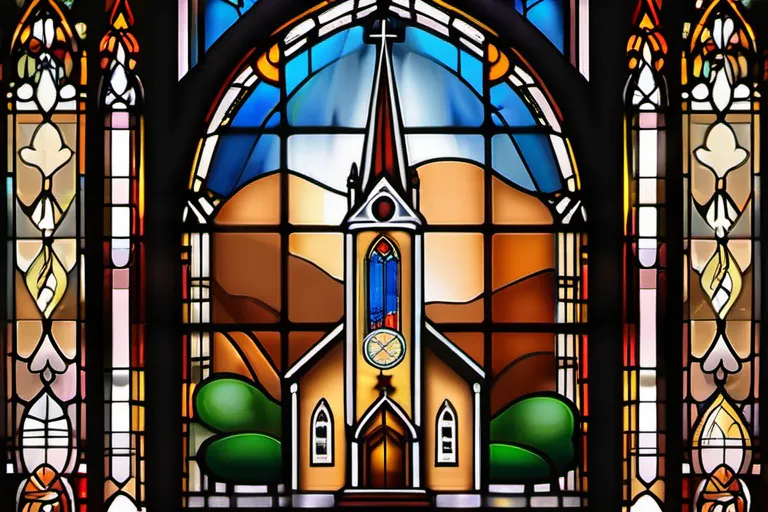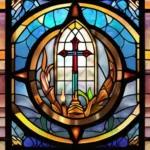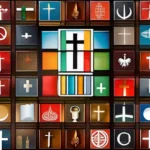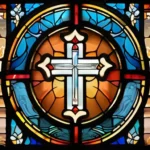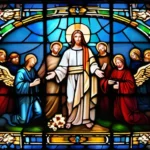Explore the history, beliefs, and denominations of Protestant Christianity.
Protestant Christianity is a major branch of Christianity that originated during the 16th century. In this article, we delve into its history, core beliefs, and various denominations. Join us as we uncover the fascinating world of Protestant Christianity.
The Birth of Protestant Christianity
Imagine stepping back into the tumultuous 16th century, a time when the world was on the brink of a seismic shift that would forever change the religious landscape. The story begins in Rome, where the Church’s practices and traditions had become mired in complexity and corruption, much like a heavily tangled ball of yarn. It wasn’t until one man, Martin Luther, decided to cut through this tangled mess with his sharp mind and bold actions that things began to unravel.
Why did Luther feel compelled to challenge the Church? Was it merely a matter of personal conscience, or was there something deeper at play? His famous act of posting The Ninety-Five Theses on the door of the Wittenberg Castle Church in 1517 was like striking a match against a powder keg. This single action ignited the flame of the Reformation, a movement that would spread far and wide, reshaping societies and faith communities.
Another pivotal figure who shaped the course of Protestant Christianity was John Calvin. While Luther’s reforms were more about challenging specific practices, Calvin sought to reform not just what people did but also how they thought—pushing for a sola scriptura (scripture alone) approach that would become central to many Protestant denominations.
But the story of Protestant Christianity doesn’t end with these two giants. It’s like a river branching into countless streams, each flowing in its own direction. From Lutheranism and Calvinism, to Anglicanism and Puritanism, each denomination carried forward different emphases on tradition, theology, and practice. The question remains: How did these differences arise, and what do they mean for the diverse landscape of Protestant Christianity today?
Core Beliefs of Protestant Christianity
Let’s delve into the core beliefs that define Protestant Christianity, exploring the heart and soul of what sets it apart from other Christian traditions. Have you ever wondered why Protestants emphasize ‘justification by faith alone’? It’s a concept that goes to the very essence of their faith.
This belief is rooted in the idea that a person’s standing before God is determined solely through their personal trust and acceptance of Jesus Christ, not through good works or adherence to church laws. Imagine it like climbing a mountain; reaching the summit isn’t about how many steps you take but about recognizing the path and trusting your guide. For Protestants, justification by faith alone is that guiding principle.
The authority of Scripture also stands as a cornerstone in Protestant beliefs. Unlike other Christian groups, Protestants hold the Bible as the ultimate source of truth and guidance, often citing it with a reverence akin to holding a holy scripture. It’s not just read; it’s lived by. How many times have you pondered the verses that shape your daily life? This emphasis on Scripture ensures that every belief and practice is grounded in divine revelation.
Another key belief is the priesthood of all believers, which means every Christian has direct access to God without needing a mediator like a priest. It’s as if everyone gets their own personal connection to the divine, bypassing layers of religious hierarchy. This concept empowers individuals, making them feel closer to God and more responsible for their spiritual journey.
Finally, the doctrine of justification by faith alone challenges us to question our reliance on external measures of worth or goodness. It’s a profound shift that transforms the way we view ourselves in relation to God. Do you ever find yourself wondering if your actions are enough? This belief invites us to focus on the heart instead of the deeds.
These core beliefs—justification by faith alone, the authority of Scripture, the priesthood of all believers, and the importance of personal connection with God—are what truly define Protestant Christianity. They form a tapestry woven from threads of biblical doctrine, personal faith, and communal practice. Together, they create a vibrant tradition that continues to inspire and guide millions around the world.
Protestant Denominations: A Diverse Landscape
As we delve into the diverse landscape of Protestant Christianity, it’s like exploring a vast garden filled with different species of flowers—each unique yet interconnected. Let’s take a closer look at some of these denominations that have shaped and continue to shape Christian thought and practice.
Lutheranism is one of the oldest branches, born out of the Reformation in 16th-century Germany under Martin Luther. Imagine you’re walking through a dense forest and suddenly encounter a path illuminated by sunlight—this could be seen as the breakthrough that was Protestantism. Luther’s emphasis on ‘justification by faith alone’ (sola fide) is like finding a beacon in the darkness, guiding countless souls towards a personal relationship with God.
Calvinism, with its roots in Switzerland during the 16th century, offers another fascinating path. Think of it as a river that splits into many streams, each flowing but still connected to its source. John Calvin’s doctrine of ‘predestination’ and his emphasis on church governance through elders (the presbyterian system) created a structure that spread far beyond Switzerland, influencing not only religious practices but also political structures in places like Scotland and North America.
Anglicanism, with its origins in England during the 16th century under King Henry VIII, presents another unique perspective. It’s like walking through an English garden where you see both roses and lilies—beautifully blended yet distinct. The Anglican Church maintains a blend of traditional Catholic practices with Protestant doctrines, creating a rich tapestry that has influenced not only England but also countries like the United States, Australia, and South Africa.
Baptist denominations emphasize believer’s baptism and congregational governance. Think of it as a group of people coming together to build their own shelter in a forest—each community decides its rules and practices based on their interpretation of Scripture. This emphasis on individual faith and direct interaction with God has made Baptists one of the fastest-growing Protestant groups worldwide.
These denominations, like the different flowers in our garden, all contribute to the beauty and complexity of Protestant Christianity. Each one offers a unique lens through which Christians can understand their relationship with God, influencing worship practices, moral viewpoints, and social engagement. As we continue our journey, let’s remember that these branches are not only part of the tree but essential to its strength and diversity.
The Role of Protestant Christianity in Society
How has Protestant Christianity shaped our world? The impact of this diverse and dynamic religious tradition extends far beyond its places of worship, influencing societies in profound ways. From the political landscapes to the cultural fabric, Protestantism has left an indelible mark on history.
Imagine a society where individual freedom and personal responsibility are not just ideals but guiding principles. This is often attributed to the sola scriptura and sola fide doctrines that emphasize the authority of the Bible over church traditions and the importance of faith in justification. These beliefs have fostered a spirit of independence, challenging both monarchs and commoners alike.
In the realm of politics, Protestantism played a pivotal role during the Reformation period. The ideas of Luther, Calvin, and others challenged the authority of the Catholic Church and questioned the nature of governance itself. Can you imagine how different history might have been if these ideas had not sparked revolutions and reforms? These movements not only changed religious practices but also laid down the groundwork for democratic principles.
But it’s not just in grand, historical contexts that Protestantism makes an impact. In everyday life, its influence is evident in the way people approach work, family, and community. The Protestant ethic, as described by sociologist Max Weber, suggests a strong connection between religious beliefs and economic productivity. It posits that hard work and frugality are not just moral virtues but also means to achieving success.
From the bustling streets of New York City where Broadway performances blend faith with artistic expression, to the quiet neighborhoods where Sunday services bring communities together, Protestant Christianity weaves its way into the very fabric of daily life. How does your community reflect these influences? Do you see evidence of Protestant values in how people interact and conduct themselves?
The impact of Protestant Christianity on culture, politics, and daily life is multifaceted and complex. It’s a testament to the enduring power of religious ideas to shape not just individuals but entire societies. As we continue our journey through this guide, consider these questions: How has Protestantism influenced your own community? And what are the ongoing impacts in modern society?
Controversies and Debates within Protestant Christianity
As we delve into controversies and debates within Protestant Christianity, one cannot help but wonder how such a diverse and dynamic religion can harbor such significant disagreements. The ordination of women has long been a contentious issue, sparking fierce discussions among various denominations. Is it not about time for churches to reflect the diversity of their congregants in leadership roles? While some argue that biblical texts support traditional views, others believe that progressive interpretations and social justice demands call for change. This debate often reflects broader societal tensions and the struggle between tradition and modernity.
The role of homosexuality within Protestant Christianity is another heated topic. Should LGBTQ+ individuals be embraced or rejected? Many churches wrestle with this question, torn between their commitment to religious doctrine and the principles of inclusivity and love that underpin Christian values. The holy book speaks of love and acceptance, but how are these teachings applied in practice when dealing with sexual orientation?
The ordination debate is akin to a tug-of-war where each side holds onto differing beliefs. Those who advocate for women’s ordination see it as an issue of equality and justice, while those opposing it often cite historical traditions and scriptural interpretation. Both sides have compelling arguments, making the resolution complex.
Similarly, the inclusion of LGBTQ+ individuals in churches mirrors a broader struggle for societal acceptance. Proponents argue that love knows no boundaries and that all humans are created in God’s image, deserving respect and equal treatment. Critics counter with concerns about moral integrity and traditional family values. This debate often highlights the tension between personal faith and social norms.
These controversies within Protestant Christianity serve as a reminder of the religion’s adaptability and its role in shaping modern society. As these debates continue, they challenge believers to re-evaluate their beliefs and engage with the complexities of contemporary issues. The journey towards resolution may be long, but it is essential for the continued relevance and growth of Protestant Christianity.
The Future of Protestant Christianity
As we look towards the future, one cannot help but ponder: how will Protestant Christianity navigate the tumultuous waves of secularization and globalization?
Secularization poses a significant challenge to many religious communities, including Protestantism. It’s like a river eroding the banks of faith; as societies become increasingly focused on individual freedom and personal choice, traditional institutions struggle to maintain their relevance. Will Protestant Christianity adapt or face a gradual decline?
The process of globalization introduces another layer of complexity. With cultural exchanges happening at unprecedented speeds, Protestant denominations must decide whether to embrace diversity or preserve their unique identities. It’s akin to deciding if a garden should remain a carefully tended plot or be allowed to grow wild with the surrounding environment. Can these churches find a balance between tradition and innovation?
One might argue that Protestant Christianity is inherently adaptable, having gone through numerous reformations throughout history. This adaptability could be its greatest strength in facing modern challenges. Yet, adaptation requires not just change but a willingness to let go of what no longer serves the community effectively.
In conclusion, as we stand at this crossroads, the future of Protestant Christianity depends on how well it can integrate with the world while staying true to its core beliefs. This journey will be marked by trials and triumphs, but ultimately, it will shape the landscape of religious thought for generations to come.
Conclusion
 By understanding the historical context, key beliefs, and diverse denominations within Protestant Christianity, you’ll gain a deeper appreciation for this significant religious movement.
By understanding the historical context, key beliefs, and diverse denominations within Protestant Christianity, you’ll gain a deeper appreciation for this significant religious movement.

